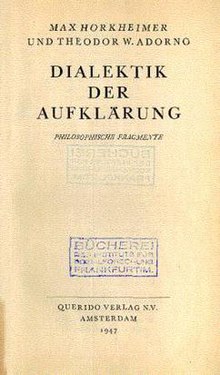
Back جدل التنوير (كتاب) Arabic Dijalektika prosvjetiteljstva BS Dialèctica de la Il·lustració Catalan Oplysningens dialektik Danish Dialektik der Aufklärung German Dialéctica de la Ilustración Spanish دیالکتیک روشنگری Persian Dialectique de la Raison French Dialettica dell'illuminismo Italian 啓蒙の弁証法 Japanese
 | |
| Authors | Max Horkheimer Theodor W. Adorno |
|---|---|
| Original title | Dialektik der Aufklärung |
| Translator | John Cumming (1972) |
| Language | German |
| Subjects | Philosophy, social criticism |
Publication date | 1947 |
| Publication place | Germany |
Published in English | 1972 (New York: Herder and Herder) |
| Media type | Print (pbk) |
| Pages | 304 |
| ISBN | 0-8047-3633-2 |
| OCLC | 48851495 |
| 193 21 | |
| LC Class | B3279.H8473 P513 2002 |
Dialectic of Enlightenment (German: Dialektik der Aufklärung) is a work of philosophy and social criticism written by Frankfurt School philosophers Max Horkheimer and Theodor W. Adorno.[1] The text, published in 1947, is a revised version of what the authors originally had circulated among friends and colleagues in 1944 under the title of Philosophical Fragments (German: Philosophische Fragmente).[2]
One of the core texts of critical theory, Dialectic of Enlightenment explores the socio-psychological status quo that had been responsible for what the Frankfurt School considered the failure of the Enlightenment. They argue that its failure culminated in the rise of Fascism, Stalinism, the culture industry and mass consumer capitalism. Rather than liberating humanity as the Enlightenment had promised, they argue it had resulted in the opposite: in totalitarianism, and new forms of barbarism and social domination.[3]
Together with Adorno's The Authoritarian Personality (1950) and fellow Frankfurt School member Herbert Marcuse's One-Dimensional Man (1964), it has had a major effect on 20th-century philosophy, sociology, culture, and politics, especially inspiring the New Left of the 1960s and 1970s.[4]
- ^ Max Horkheimer; Theodor W. Adorno (1972) [1947]. Dialectic of Enlightenment. Translated by John Cumming. New York: Herder and Herder. ISBN 0-8047-3633-2. OCLC 48851495.
- ^ Schmidt, James (1998). "'Language, Mythology, and Enlightenment: Historical Notes on Horkheimer and Adorno's Dialectic of Enlightenment.'". Social Research. 65 (4): 807-38 (p.809).
- ^ Cikaj, Klejton (2023-05-04). "Dialectic of Enlightenment: Adorno & Horkheimer's Work in 6 Parts". The Collector. Retrieved 2024-03-22.
- ^ Held, D. (1980). Introduction to Critical Theory: Horkheimer to Habermas. Berkeley, CA: University of California Press.